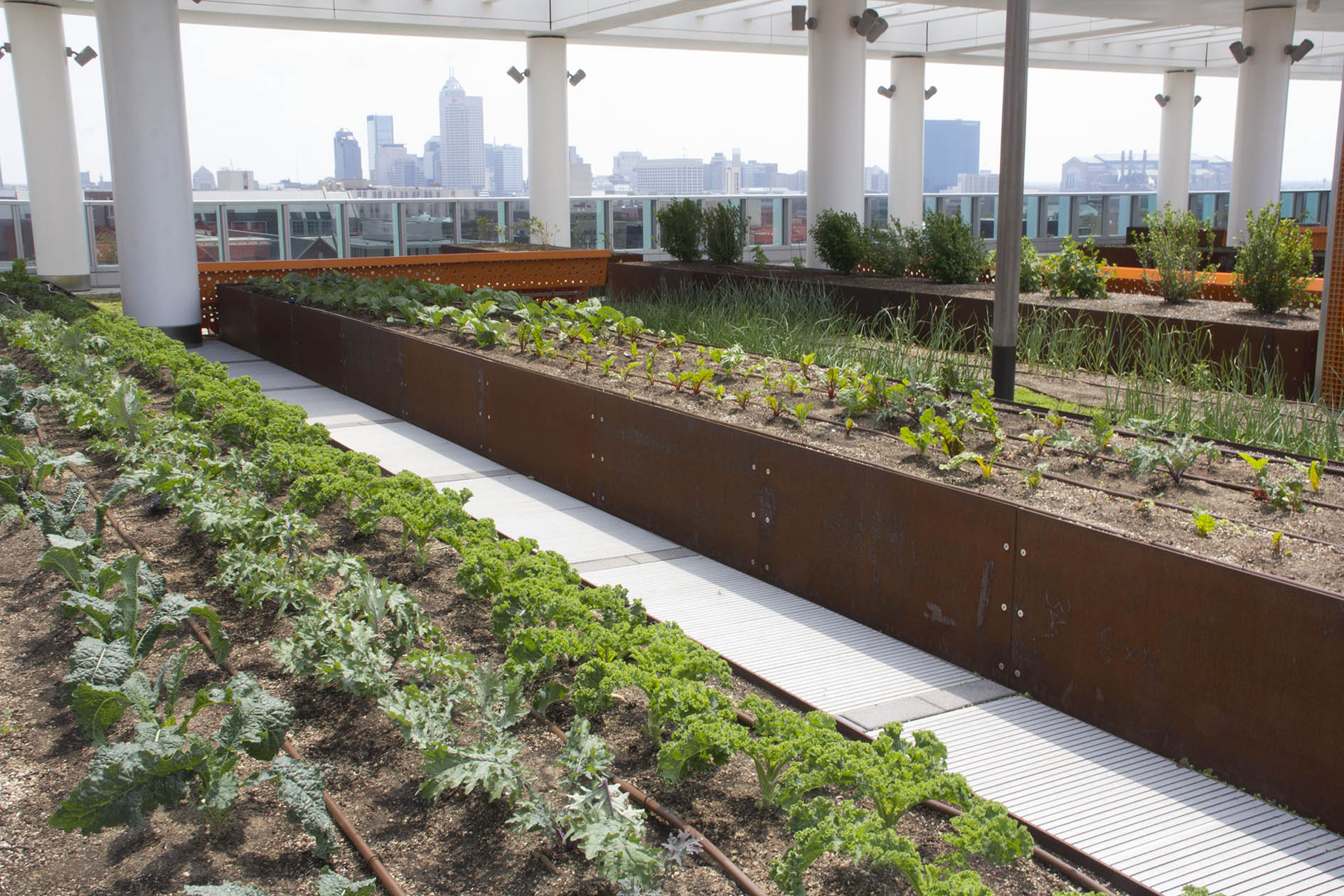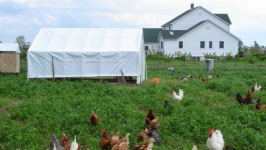Indiana’s First Sky Farm. Eskenazi Health takes the lead on making a difference.
The surroundings are über urban. The Eskenazi Health and nearby IU Health campuses teem with traffic, pedestrians, cyclists and congestion. The sprawling and modern lobby of the Sidney and Lois Eskenazi Hospital bustles with patients, doctors, administrators and visitors rushing in every direction, each on his or her own personal mission. Sirens wail in the background and EMTs fly through, pushing stretchers.
Yet seven stories above the noise and drama, the first tentative tendrils of pea shoots and baby lettuces peek up through the dirt, heralding spring. As spring turns to summer, an extraordinary bounty of fresh vegetables, herbs and berries will follow, defying the urban scene, and feeding the minds, bodies and souls of patients and hospital staff alike.
This is the Eskenazi Health Sky Farm.
The Sky Farm integrates the hospital’s core philosophy of preventative health measures—and eating fresh, locally grown food is at the top of that list.
“Our CEO, Dr. Lisa Harris, is a passionate advocate of a healthy lifestyle and preventative medicine,” said Todd Harper, manager of media and public affairs. “She was the driving force behind the Sky Farm. As we planned this new building, the garden was always a part of it, and there was a lot to consider—irrigation, drainage and just the weight of it all. But we were committed to making this happen. To our knowledge, this is one of a kind. We don’t know of any other hospital that is doing what we’re doing, on this scale.”
The Sky Farm covers the entire roof of the hospital—about 5,000 square feet, or one-tenth of an acre. And those pea shoots have an amazing view of the city from every angle. A total of 24 beds grow an astonishing array of crops. In its first growing season, it produced a total of about 90 pounds per week (2,200 pounds for the whole season.) The yield included baby kale, baby mustard, assorted lettuces, arugula, spinach, bok choy, beets, peas, lacinato, winterbor, red Russian kale, collard greens, chard, beans, onions, garlic, radishes, asparagus, tomatoes, leeks, scallions, carrots, squash, eggplant, cucumbers, turnips and celery, along with strawberries, blueberries and a multitude of herbs.
Farmer Rachel White, through a partnership with Growing Places Indy, lovingly tends all of these crops. White works year-round, sowing the first seeds in February and harvesting the last of the crops in November. In between, she focuses on community involvement and educational classes, and has plans to ramp up those programs for the 2015 season.
“The first year was a big learning curve for us,” said White. “We faced some challenges and solved some problems. We were caught off guard by the impact the wind had on transplanted crops, so we’re doing more with seeds this year. And we added a trellis for shade. Also, the ground freezes faster up here, so we have to take that into consideration when we plan.”
As the spring and summer crops mature, volunteers from both the hospital staff and Growing Places Indy step in to help harvest, and White is in regular communication with the chefs for the Marketplace cafeteria and Café Soleil, the full-service, sit-down restaurant. Because the hospital prepares over 2,600 retail meals and 950 patient meals per day, the bounty from the Sky Farm contributes a fairly small percentage of the total produce offered, but the chefs plan their menus, specials and ordering around what is available from the garden. Menus will note which ingredients in a particular dish have been harvested from the Sky Farm.
The mission of the Sky Farm is not just to grow food for the hospital’s patients and staff. It is also intended to grow a relationship between the earth and the soul for those who visit. In season, it is open 24 hours a day, seven days a week, and patients, visitors and staff often retreat to the roof to eat a meal, enjoy the view of the city, have a quiet moment, put their hands in the dirt and recharge their spirits. Some of the beds are even designed to be reachable from a wheelchair.
This year it will open to the public so that all members of the community can enjoy the rooftop sanctuary, as well. And as the outreach programs expand, community members can participate in gardening classes, seasonal eating seminars and other programs designed to help city dwellers stay in touch with the roots of the food they eat.
“People can take food for granted,” said White. “They may have never seen what celery looks like when it’s growing in the ground. I’d like to change that.”
Written by Karen Kennedy, Photography by Eskenazi Health





